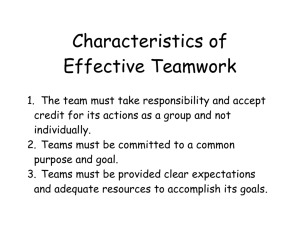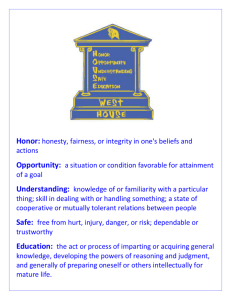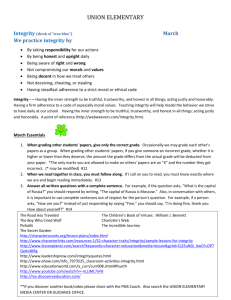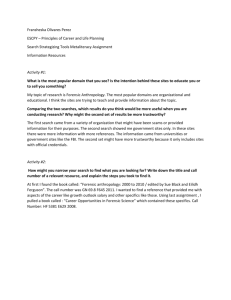Click here to text
advertisement
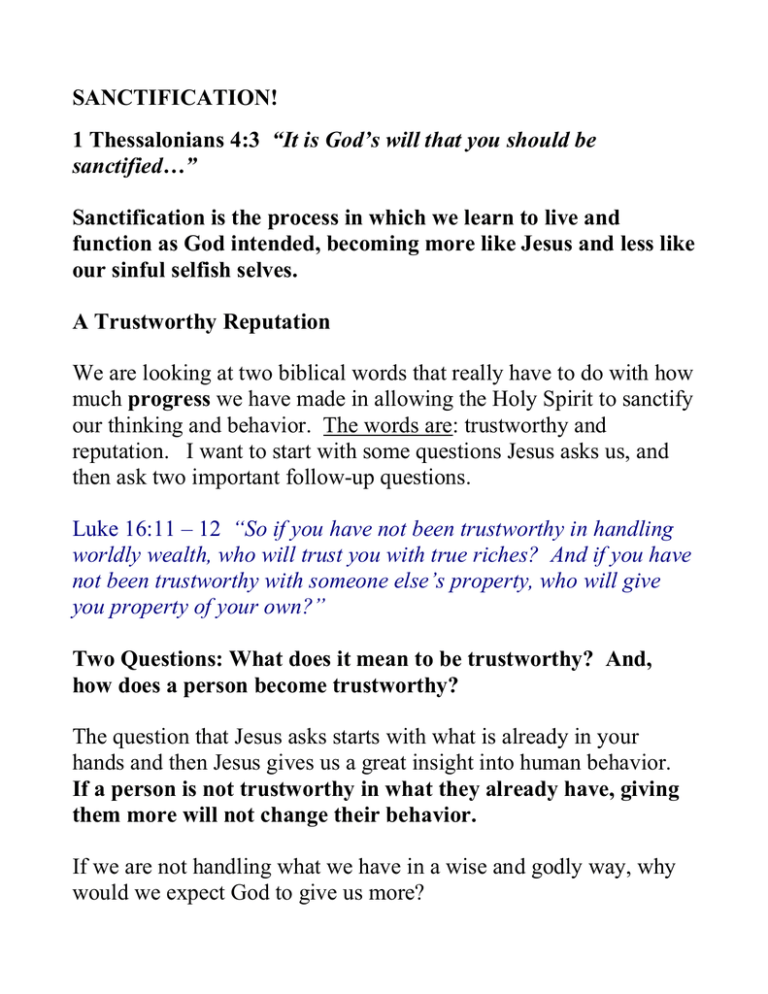
SANCTIFICATION! 1 Thessalonians 4:3 “It is God’s will that you should be sanctified…” Sanctification is the process in which we learn to live and function as God intended, becoming more like Jesus and less like our sinful selfish selves. A Trustworthy Reputation We are looking at two biblical words that really have to do with how much progress we have made in allowing the Holy Spirit to sanctify our thinking and behavior. The words are: trustworthy and reputation. I want to start with some questions Jesus asks us, and then ask two important follow-up questions. Luke 16:11 – 12 “So if you have not been trustworthy in handling worldly wealth, who will trust you with true riches? And if you have not been trustworthy with someone else’s property, who will give you property of your own?” Two Questions: What does it mean to be trustworthy? And, how does a person become trustworthy? The question that Jesus asks starts with what is already in your hands and then Jesus gives us a great insight into human behavior. If a person is not trustworthy in what they already have, giving them more will not change their behavior. If we are not handling what we have in a wise and godly way, why would we expect God to give us more? ILLUS. - If we are borrowing or renting someone else’s property and we are not responsible with that, why would anyone believe that giving us more would help us to become responsible? Jesus presents this truth of small to greater, and we struggle with this truth because we want to be nice to everyone, whereas love calls us to be wise. What I mean is that we want everyone to be rewarded and that sends the message that it doesn’t matter whether you are responsible or not, you still get rewarded. Jesus is interested in trusting us with more, but He is looking to see what we are doing with less. And He does reward and honor us when we prove ourselves to be trustworthy! Luke 19:17 “Because you have been trustworthy in a very small matter, take charge of ten cities.” Let’s ask the questions again: What does it mean to be trustworthy? And, how does a person become trustworthy? First: What does it mean to be trustworthy? Probably most of us would agree that we would like to be known as a trustworthy person, right? How we are known, has to do with our reputation. How have people experienced you – as trustworthy or as not trustworthy? Proverbs 27:21 (GNT) says, “Fire tests gold and silver; a person’s reputation can also be tested.” Life tests us! Circumstances test us! Temptation tests us! Peer pressure tests us! Children test us! This goes deep into what is really in a person’s heart. What is in us comes out! So, what does it mean to be trustworthy? Simply put, trust means confidence. The opposite of trust – distrust – is suspicion. When you trust someone, you have confidence in them that they will do what is right, and if they don’t they will own up to it and take personal responsibility for where they failed. Here’s an important question: Who do you trust? Here’s an even more important question: Who trusts you? Trust is foundational for healthy growing relationships! In his book, "The Speed of Trust," Stephen Covey tells about doing an exercise with a business firm in which he which he gave everyone a stack of pictures of everyone else they worked with. Then he asked them to privately divide the pictures into two piles – the people you trust and the people you don’t trust. He said that as he looked at the stacks of pictures, it was interesting to note that the same people tended to be trusted or not trusted by all. Then he asked them, which pile do you think others put your picture in, and why? You may say, “That’s judging!” I would say that the Bible calls that being discerning. To judge is to stand in the place of God. To be discerning is to have insight into what you are seeing. What life patterns are you seeing, what fruit, and what does that tell you? Proverbs 24:8 (NLT) “A person who plans evil will get a reputation as a troublemaker.” Your reputation is what other people have found to be true about you. Biblically the word means “witness.” In other words, it is what others have witnessed as they observed your life patterns. In Exodus 18:21 Moses was instructed to select capable men – men who fear God, trustworthy men who hate dishonest gain – and appoint them as officials over the people. In Acts 6 the apostles told the church to look for seven men to oversee the food distribution. Note what verse 3 says they were to look for: “Men of good reputation, full of the Spirit and of wisdom.” The temptation is to want position, respect, status, a title, etc. without paying the price to build a trustworthy reputation. Listen: To have a good reputation does not mean you are perfect. It means that the patterns people observe in your life tell them that you are a person who can be trusted. They can give a good witness about you. It means that what others know and see about you says that you are trustworthy. This effects your potential! Proverbs 3:3 – 4 (NLT) says, “Never let loyalty and kindness leave you! Tie them around your neck as a reminder. Write them deep within your heart. Then you will find favor with both God and people, and you will earn a good reputation.” “Tie down around your neck…” In other words take them with you as part of your life, of who you are, wherever you are – on the job, at home, among your friends, in school, at church, etc. How do you get a good reputation? You earn it! How do you get a bad reputation? You earn it! Ecclesiastes 7:29 says, “This only I have found: God made man upright, but men have gone in search of many schemes.” God’s Word gives us insight: Proverbs 12:22 “The Lord detests lying lips, but he delights in people who are trustworthy.” Proverbs 11:13 “No one who gossips can be trusted with a secret, but you can put confidence in someone who is trustworthy.” (Insight: What will a person who gossips to you do with your secrets?) I believe we would all say that Jesus was and is trustworthy! And we would agree that he had and has a good reputation, even though some in his day and also today try to smear his name. Jesus taught his followers to be trustworthy and to be of a good reputation because he knew that would determine the potential of their lives. That is still true today! Two truths: 1. The devil wants to destroy your good reputation in order to weaken your witness of Jesus. Nehemiah 6:13 (GNT) “They (Tobiah and Sanballat) hired him (Shemaiah – prophet) to frighten me into sinning, so they could ruin my reputation and humiliate me.” The devil will do what he can to frighten you away from being a trustworthy person, to tempt you, to intimidate you, to get you to back down, give in, compromise, be untruthful…so that he can destroy your potential, and your witness, and your reputation. 2. God wants to use your good reputation to show off Jesus in you! Titus 2:10 (NLT) “…show themselves to be entirely trustworthy and good. Then they will make the teaching about God our Savior attractive in every way.” Second Question: How does a person become trustworthy? How do we grow, and make progress in our potential, advance in purity and power? Or, how do we fix broken trust? Remember that building or restoring trust is not about fixing somebody else or manipulating their feelings. It's about you taking responsible action that will change their level of confidence in you. You can't force people to trust you or demand it; you earn it! This will be challenging, but it is a challenge deserving of your best! 1. It takes time plus right behavior. The goal is to be trained by God in new patterns. Trust = time + right behavior. It's earned. It is not a right! This is also true when you have trusted and been hurt. To never trust anyone again is to only hurt yourself even more. Rather our need is to grow in discernment and learn to invest trust wisely. Frank Cane notes, "You may be deceived if you trust too much, but you will live in torment if you don't trust enough." Learn from Jesus. Jesus did not have a suspicious attitude toward people, but he was discerning. He didn't trust the Pharisees or the crowds. So, if it is restoring trust you have broken, that will take time plus right behavior on your part. If it learning to trust again, it takes time, growing in discernment, and investing trust wisely. 2. Be accountable. In Acts 11:4 Peter explains his actions to the church. I see how the Holy Spirit had worked in this man and redeemed his failures – remember, he denied Jesus – but now a sanctified attitude of accountability has matured in Peter’s heart. He is willing to be biblically accountable. (This doesn’t mean let anyone who feels like it, condemn you and put you down. It does mean that I am willing to have my behavior checked out by God’s Word. Did I do something that is unbiblical, or did I just do something that you don’t like?) 3. Let your actions speak louder than your words! Empty promises are empty of transforming power. You see, the best predictor of future behavior is past behavior, so you can say, “I promise I’ll never…” But the question is, “Based on what? What are the actions that are the fruit of repentance that will demonstrate that your words are for real? What is your plan of action? We may say we want to be trusted, but be unwilling to take the actions that will demonstrate that we can be trusted. If a person's actions have damaged trust, what are they willing to do to repair it? You won’t help anyone to change or grow by taking a “Let’s be nice approach, but rather by taking the let’s be loving, firm, and wise approach.” In spiritual coaching, or faith coaching we look for what a person is willing to do. Sometimes we say, “I heard what you said you need to do, would like to do…or should do, what I would like to know is what will you do? When will you begin? Who will you be accountable to?” That’s letting your life declare the new intentions and desires of your heart! It's behaving in a way that inspires trust. Stephen Covey calls this “Behaving yourself out of problems that you’ve behaved yourself into.” The Bible calls it the fruit of repentance and letting Christ be formed in us! So, in order for you to grow in a trustworthy reputation, where do you need the sanctifying power of the Holy Spirit to transform your behavior? Is it honest communication (Call things what they are, not what you want people to believe they are!), that is joined with actions? Righting wrongs? Practicing accountability? (Tell the truth in ways that people can verify. No hiding!) Keeping commitments? Taking responsibility for your choices instead of blaming or excusing? Being real when you fail? (No cover-ups. Rather let love cover over.) Build a new reputation of someone who does what he says and can be trusted. Earn trust and after you have earned it, then protect it. “Search me, O God and know my heart…try me and know my thoughts. See if there be any wicked way in me and lead me in the right and everlasting way.” Let a man or woman, or youth…examine themselves….
